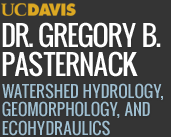Grading Policy
Grades for this course will be determined by considering four weighted components: a midterm, final exam, in-class presentaiton, and Field/homework reports.
Exams:
You will take a one-hour midterm and a two-hour final exam. These exams focus on the concepts behind field, lab, and data analysis procedures. I strongly recommend you studycourse readings, lectures, and reports before the exam.
In-class Presentation:
You will give one 15 minute presentations (actual length depends on number of students in class) in which you instruct your peers on the key findings of a scientific paper which you will be given in advance. I will grade you based on how well you present all the relevant information in the alloted time (with consideration to past oral experience or lack thereof). I recommend that you use the blackboard and overhead projector to streamline and complement your presentation. Blank overheads may be obtained from Tania Heta in the Hydrology Office or purchased at any office supply store. To serve the other students in the class, you must prepare and distribute a 1 page abstract of the presentation (in your own words) along with an optional second page showing one or two key figures, graphs, or tables that convey the most essential points of the research. The abstract must contain the complete reference citation.
A special reading to help you improve your speaking skills is available by download in .pdf format by clicking here. I recommend that you do your talk 4-8 times in practice before your day arrives.
Field reports/homework:
You will do 2 major assignments in this course- one on deltas/estuaries and one on salt marshes. An assignment is a full report consisting of data presentation and analysis based on questions that explore the field subject in depth. You will turn in your own report for individual grading once your group is through with data gathering and data analysis.
- Late Policy: For you to get full credit, your homework must be turned in at the beginning of class on the due date. You have 3"grace days" for late homework. That is, you can turn in a total of three homework assignments a day late, one homework three days late, etc. Weekends count as one day. Assignments turned in late without "grace credit" will be penalized by 20% per day. Homework late by more than 5 days will not be graded. Exceptions require either prior arrangement or doctor-validated medical excuse.
Grade Weights
midterm = 25%
final = 25%
inclass presentation = 10%
reports = 40%
*There is no specific portion of your total grade allocated to participation, but this is an important part of your overall performance and will be used to help assign grades in borderline situations. If you do not participate equally in field work and data analysis, this will hurt everyone in your group. I will try to identify students who are not participating equally and adjust his or her individual grade accordingly.
General Instructions for Field reports/homework
Clarity of presentation is very important. A good layout, well-organized tables and graphs, and good graphics must be used if you want your work to be understood and thus graded properly. Clear, concise writing and spell checking is expected.
Report Format
- The first page should be a cover sheet with the student's name, date, class number, and title of report.
- The second page should contain a written description of the student's understanding of the problem that was assigned. This is to be followed on succeeding pages by a description of the analysis, discussion, interpretation, and conclusions.
- When you do calculations, state how they were done and show formulas whenever possible. If a computer program was used, state the name of the program and what command was used The more of the calculation process you show, the most opportunity there is for partial credit.
- Data should be presented in a tabular format with a descriptive title. Columns should be names and data units labeled. Short explanations may be added as footnotes, if necessary.
- Graphs should have a descriptive title, labeled axes with appropriate scales, and identified units. The source of the data in the plot should be given either in the title or under the graph.
- Maps should have a descriptive title, a scale, and a north arrow.
- These reports constitute 60% of your grade, so the more time you put into them, the better your grade will be. Also, if they are neat, you may find them useful in your future work beyond shool.
Collaboration Among Students
- Field exercises and data analyses necessitate collaboration in this class, just as they do in the real world. You are encouraged to work together with other students to obtain all of the necessary data, results, maps, tables, and figures. You may discuss the significance of your findings with anyone else in the class. However, when it comes time to write your report, no further collaboration is allowed. You must produce your own report in your own words.


